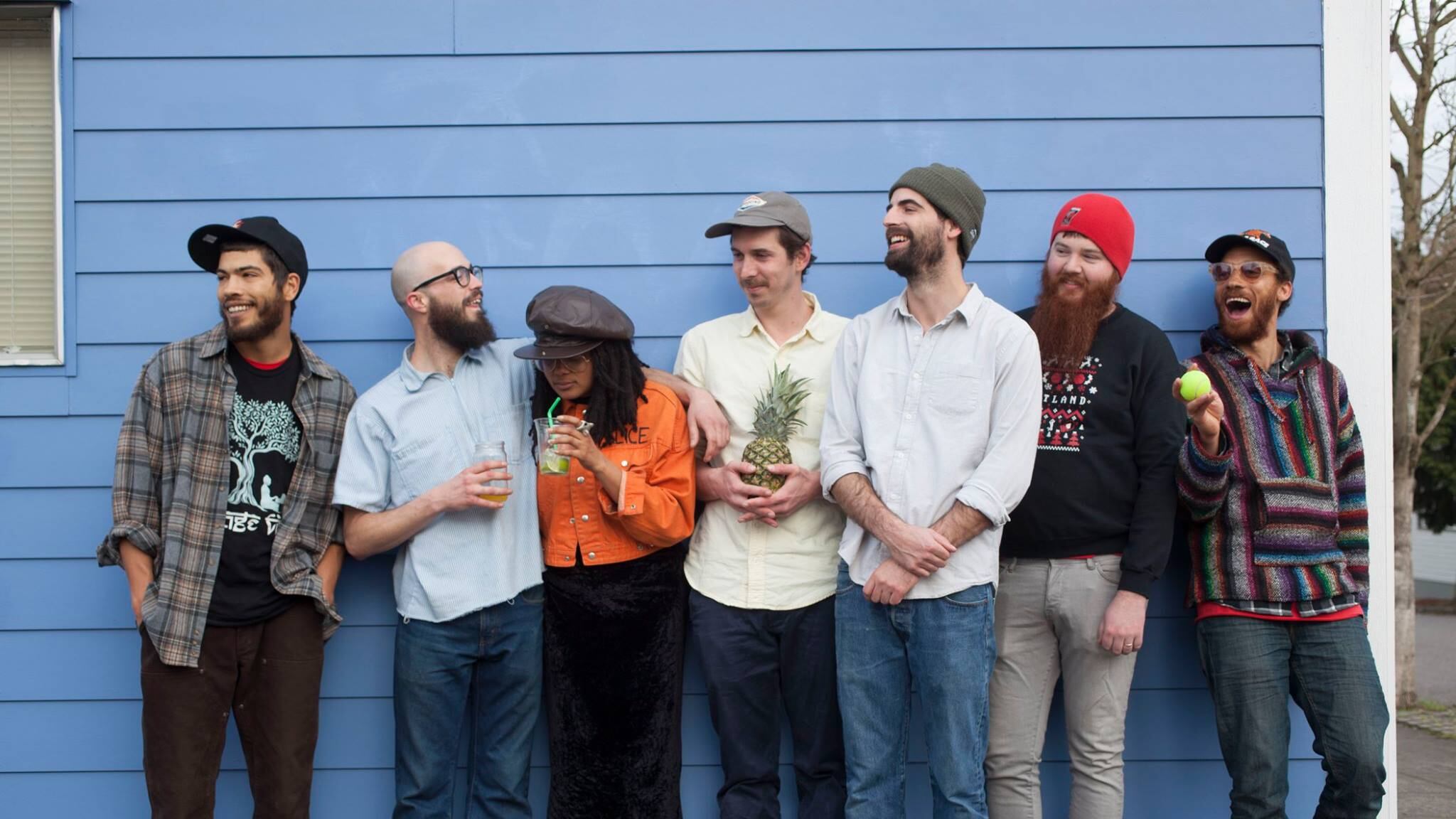Tribe Mars doesn't take songwriting lightly.
"Love is a big part of our music," says drummer Robert Grubaugh, sitting in a shady corner of Colonel Summers Park with guitarist and vocalist Brett Van Patten and MC Santigie Fofana-Dura. "I know personally, I'm just trying not to sing about bullshit, you know?"
Already, the spacey, improvisational jazz and hip-hop collective has established themselves as prolific performers. But Tribe Mars' dedication to music with a higher purpose might explain why, in their five years of existence, Tribe Mars has never released an album. But this week, the band is finally releasing their self-titled debut.
"It's been about two years since we started the album," says Van Patten. "We've been playing live for a long time, and we saved up all the money from our shows [to pay for recording]."
Since their inception in 2013, Tribe Mars built their reputation on their magnetic live shows. Onstage, Tribe Mars has an intoxicating aura. The band currently has seven active members and an equally expansive sound. Tribe Mars plays a futuristic synthesis of R&B, soul, funk and jazz. Held down by two vocalists and an MC, their sound is so resonant, it seems to sit in the air around you, like the smoke rising from a joint.
Along with their energetic live shows, their singular sound has made Tribe Mars regulars at indie venues like Doug Fir and Holocene, as well as jazz- and funk-oriented clubs like Jack London and the Goodfoot. But when Tribe Mars first formed, their genre-straddling sound wasn't always an asset. Until recently, Portland's indie, hip-hop and improvisational scenes had little crossover. That's beginning to change, but for Tribe Mars, finding their spot in Portland's indie rock-centric venues wasn't easy.
"It was always a little weird when we played with indie bands, just because we're so different," Van Patten says.
Tribe Mars never intended to become a crossover band. Grubaugh and Van Patten were just interested in establishing a musical chemistry by playing constantly and compulsively.
The band began to take shape when the pair came to Portland from Northern California. "We moved into a double around Foster and Powell," Van Patten recalls. "We'd just play at all hours. I was always worried the neighbor would get mad, but he always just said, 'It sounds great!'"
Eventually, they met keyboardist Andre Burgos, who then introduced them to Fofana-Dura. They also added bassist Aaron Brennan, who grew up playing music with Van Patten back in California.
As Tribe Mars accumulated musicians with a wide array of backgrounds, the band began to develop its expansive sound. But their loose, improvisational approach to hip-hop also made the band difficult to categorize.
Eventually, Tribe Mars found their niche. "That first show at the Goodfoot was huge for us," says Van Patten. After playing at the Goodfoot—which hosts everything from funk to Americana to world beat—the band began making connections with more like-minded artists like ADDverse Effect, the Pariahs and Two Planets. In fact, Tribe Mars dedicated their debut to the memory of ADDverse Effect's Boyd Littell, who died last year.
Now, Tribe Mars is helping to bridge Portland's hip-hop and indie crowds. The lineup has continued to expand—recently, they added vocalist Vaughn Kimmons (who, with Andre Burgos, makes up R&B duo Brown Calculus) and saxophonist Kyle Merrifield. They've played with local hip-hop mainstays like Maze Koroma and R&B heat-seeker Blossom, and this year, they played at the Soul'd Out Festival.
To make their first record, the band stuck to the same relentless approach that they used to first develop their sound. Tribe Mars continued to play live consistently. When time allowed, they'd record at producer Adam Sweeney's home studio.
The band's organic stage presence and their ability to improvise with inimitable cool comes from their laborious, collaborative songwriting process. But it was important to the band that the record have its own special sound, without losing the magic Tribe Mars exhibits onstage.
It was a difficult balance to strike, but the hard work paid off. Tribe Mars does an expert job of merging the talents of each member into one smooth trip. Van Patten's spry, jazz-fueled guitar riffs ripple elegantly over Burgos' intricate keyboard orchestration and the horns add a palpable thickness. Songs like "Sun Raisin," "Helio Cinnamon" and "Mystic Prose" add to the band's cultivated interplanetary mythos, while songs like "Education" and "Ode to an Elder" deal with more earthly matters.
Even though their lyrics have a science-fiction tilt, Tribe Mars' core message is grounded in human connection.
"If you're going to put something out into the world, I'd rather it be something that is positive and inclusive," Grubaugh says. "It has to come from a place of compassion and openness."
SEE IT: Tribe Mars plays Mississippi Studios, 3939 N Mississippi Ave., mississippistudios.com, with Astro Tan and Dan Dan, on Friday, July 6. 9 pm. $8 advance, $10 day of show. 21+.

